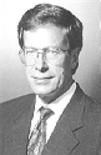Donald DeFosset
For his outstanding executive leadership at three of America's premier manufacturing companies, the Schools of Engineering are proud to present the Distinguished Engineering Alumnus Award to Donald DeFosset.
President, Safety Restraint Systems,
AlliedSignal Automotive
BSIE 1971

On studying industrial engineering
I was absolutely turned on by what went on in the industrial engineering world. It had applicability to most industries and gave me great career flexibility. I was excited by the breadth of the field-it was related not only to design but also to many other functional disciplines. There was involvement with sales and marketing people and with manufacturing people. There was an emphasis on understanding financial and economic implications of engineering decisions.
On his Purdue years
The late '60s and early '70s saw a lot of social upheaval in our country. It was a time of exposure to elements of life different from anything I had ever anticipated. When the student sit-in at the administration building took place, I was a member of the SAE fraternity, essentially an athletic house, where we looked out with a high degree of curiosity and concern over the demonstrations organized by some of our fellow students. It was a unique period. We had lived through the Berkeley and East Coast demonstrations and all the associated reports in the press, but to see it take place in our backyard in staid, solid, conservative Lafayette, Indiana, was a major awakening for all of us.
On how he's changed
Today I am much broader in terms of my knowledge base and much more excited about changing things. When I was a college student, my questions had to do with understanding my environment and getting a basic comprehension of the foundations-accumulating a knowledge base. Now, twenty-odd years later, the knowledge base has been accumulated, and the question is, What do I do with it? How do I change and improve the structure, rebuild the foundation when appropriate, and re-engineer the process?
I found that the education at Purdue provided me tools that were very helpful-specifically, knowledge of the information-systems aspect of management, including data collection and analysis. In those days, computers, time-sharing services, and other electronic tools were just in their infancy. Early in my career, I was able to bring quickly into my jobs the additional dimension of systematic data collection and rapid analysis. It was revolutionary at the time. Now it's archaic. I have moved away from the more traditional command and control techniques to reliance on teamwork, decentralized empowered decision-making authority and responsibilities vested in people doing tasks, nonbureaucratic metrics, and continuous improvement by coaching rather than directing. His advice to engineering students College is the ideal time in life for students to acquire knowledge in a learning environment that they will never have a chance to see again. I think colleges and universities are starting to understand their customers a little better. The preparation students receive is not as theoretical as it used to be. There's much more immediate applicability being taught. Students need to understand as much as they can about the specific area of expertise they are learning while simultaneously getting as broad an exposure as possible to other disciplines.
On his accomplishments
My greatest accomplishments have been in growing some of the businesses I've been involved with, in taking performance to a higher plateau than people feel comfortable with or have traditionally been able to achieve, in getting them energized in a team environment to set goals far beyond normal kinds of expectations, then to aggressively go after and achieve those goals. It's always been fun and exciting to watch an organization achieve higher levels of performance collectively than we could accomplish individually.
On the secret of success
One of my MBA professors has followed our graduating class for the past 20 years to identify and evaluate the predictors for success in our careers. He tracked every kind of attribute you could measure-height, weight, sex, educational background of parents, family environment, parents' occupations, grades, SAT scores, etc. When he tried to correlate those with degree of success, the correlations were all low. The only aspect he could positively correlate was what he called competitiveness-one's individual motivation and drive to be competitive, to strive to be the best, to surpass goals and expectations, to set excellence and the pursuit of it as the ultimate goal in life.
- 1994:
- President, Safety Restraint Systems, Allied Signal. Has been instrumental in instituting total-quality programs, global strategic and product plans, and successful acquisitions and strategic alliances for the division, which manufactures air bags and seat belts.
- 1993-1994:
- Vice President and Group Executive, Turbocharging and Truck Brake Systems.
- 1992-1993:
- Vice President, Planning and Business Development.
- 1989-1992:
- Executive Vice President, Operations, Mack Trucks.
- 1988-1989:
- President, Off-Highway Products and Driveline Division, Rockwell Int'l.
- 1986-1988:
- Executive Vice President, On-Highway Products Division.
- 1985-1986:
- Vice President and General Manager, On-Highway Axle Division.
- 1983-1985:
- Vice President, Axles, and General Managing Director, Europe.
- 1981-1983:
- Managing Director, Rockwell-Fiat joint venture.
- 1980-1981:
- Director of Special Projects, Automotive Operations, Rockwell.
- 1978-1980:
- Director of Finance and Business Planning, Automotive Int'l Group.
- 1977-1978:
- Controller, Automotive Int'l Group.
- 1976-1977:
- Plant Controller (Winchester, Ky.).
- 1974-1976:
- Finance Manager, Automotive Operations.
- 1971-1974:
- Manufacturing Engineer, Automotive Operations.
BSIE 1971, Purdue; MBA 1974, Harvard.
